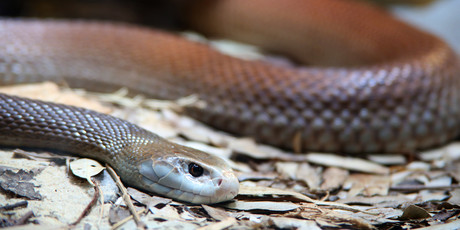Blood collection tube coated in Taipan venom

Australian biotech company Q-Sera has developed a blood collection tube which rapidly produces high-quality serum for testing. The secret to the company’s success? Proteins sourced from the venom of the Australian Coastal Taipan.
Serum is the gold standard for biochemical analysis of blood samples and is produced when blood clots. But standard serum tubes can clot poorly, leading to laboratory issues, and are unable to clot the blood of some patients — such as anticoagulated cardiac patients or people taking medicine such as warfarin or other oral anticoagulants.
“In hospitals, particularly where urgent test results are required, the delay and poor quality of serum can hold up life-saving treatment or cause errors in patient diagnosis,” said Q-Sera CEO Michael Grant.
By isolating proteins in the venom of some of the world’s deadliest snakes, Q-Sera has developed a novel class of coagulation agents patented for use in blood collection tubes. These ‘prothrombin activators’ were initially sourced from snake venom but can now be produced from modified cell lines using standard pharmaceutical manufacturing processes; the company’s lead active produced using these ‘recombinant’ methods is a coagulation agent known as RAPClot.
Blood collection tubes coated with the coagulation agent have been found to rapidly produce high-quality serum, even if the blood sample contains anticoagulants. These benefits may translate into cost efficiencies for healthcare systems and improved outcomes for patients.
The Q-Sera technology is based on the research of scientists from The University of Queensland (UQ). It was licensed to Q-Sera by UniQuest, UQ’s main commercialisation company, and has received investment from both the Medical Research Commercialisation Fund (MRCF) and Uniseed, who along with other institutional investors have funded Q-Sera’s activities.
Q-Sera is currently working with a number of multinational medical device companies to bring the technology and its benefits to the market. In addition to approval in EU, the primary patent has recently been granted in Japan, with approvals in other jurisdictions expected shortly.
Biomarkers for SIDS found in blood samples
US researchers have revealed the fingerprints of sudden infant death syndrome (SIDS) within blood...
Uncurling and 'gluing down' DNA molecules for sharper imaging
Researchers at Nagoya University have demonstrated techniques for stretching and immobilising DNA...
Novel 3D bioprinter can replicate human tissue
Biomedical engineers have invented a 3D printing system capable of fabricating structures that...




